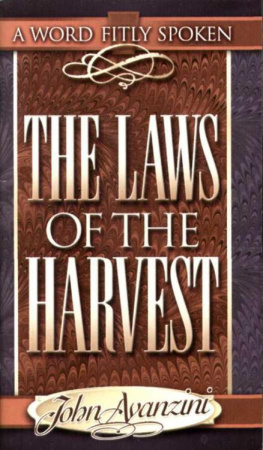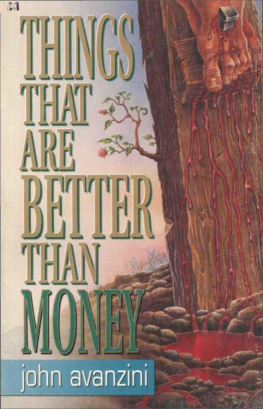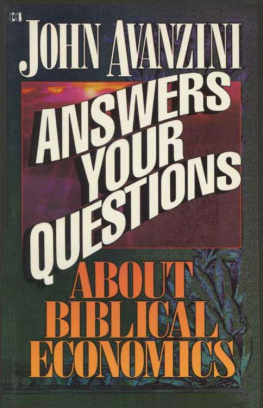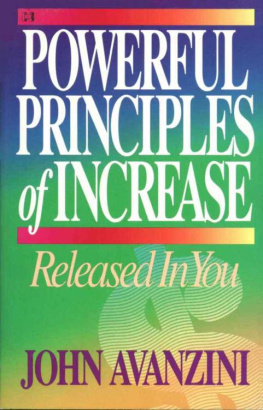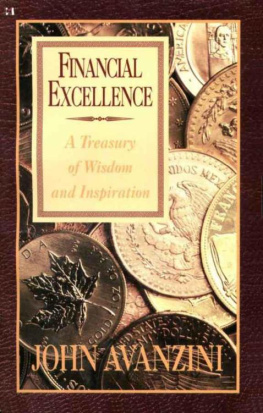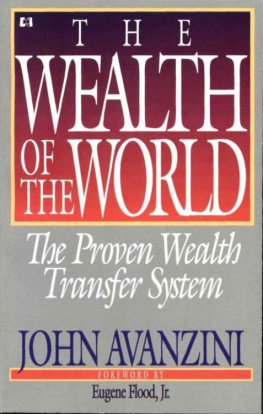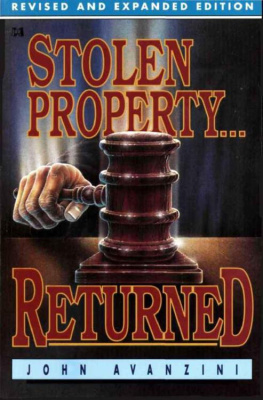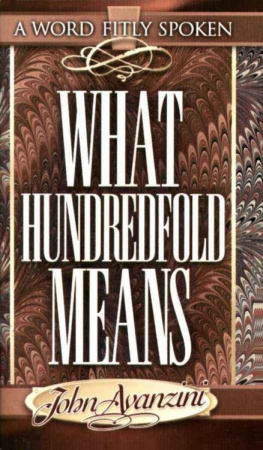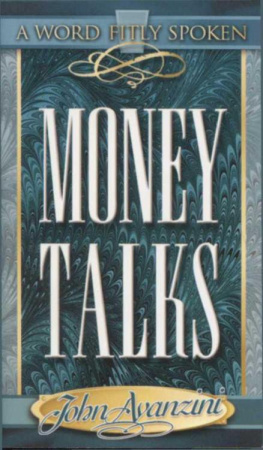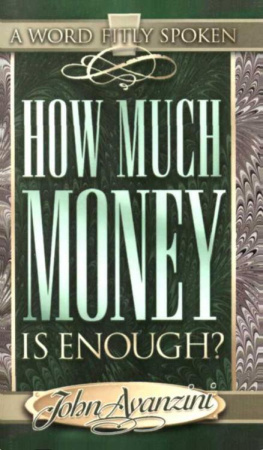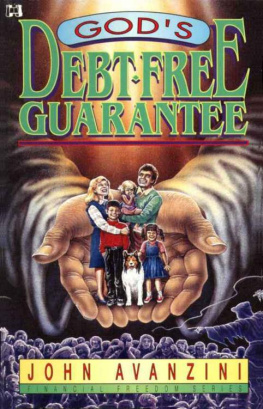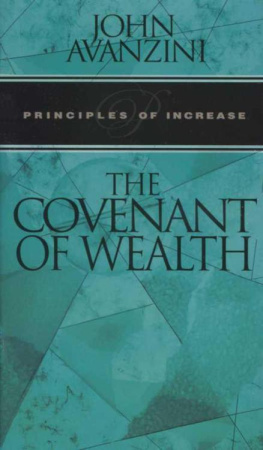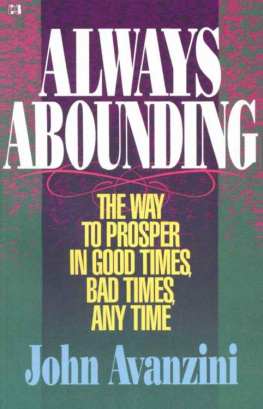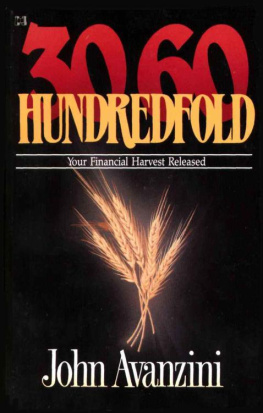John F Avanzini - [1971-1990
Here you can read online John F Avanzini - [1971-1990 full text of the book (entire story) in english for free. Download pdf and epub, get meaning, cover and reviews about this ebook. City: Fort Worth, Tex, year: [1971-1990?], publisher: HIS Pub, genre: Religion. Description of the work, (preface) as well as reviews are available. Best literature library LitArk.com created for fans of good reading and offers a wide selection of genres:
Romance novel
Science fiction
Adventure
Detective
Science
History
Home and family
Prose
Art
Politics
Computer
Non-fiction
Religion
Business
Children
Humor
Choose a favorite category and find really read worthwhile books. Enjoy immersion in the world of imagination, feel the emotions of the characters or learn something new for yourself, make an fascinating discovery.
- Book:[1971-1990
- Author:
- Publisher:HIS Pub
- Genre:
- Year:[1971-1990?]
- City:Fort Worth, Tex
- Rating:4 / 5
- Favourites:Add to favourites
- Your mark:
- 80
- 1
- 2
- 3
- 4
- 5
[1971-1990: summary, description and annotation
We offer to read an annotation, description, summary or preface (depends on what the author of the book "[1971-1990" wrote himself). If you haven't found the necessary information about the book — write in the comments, we will try to find it.
[1971-1990 — read online for free the complete book (whole text) full work
Below is the text of the book, divided by pages. System saving the place of the last page read, allows you to conveniently read the book "[1971-1990" online for free, without having to search again every time where you left off. Put a bookmark, and you can go to the page where you finished reading at any time.
Font size:
Interval:
Bookmark:
The Laws of the Harvest
The Bible says God multiplies money in the same way He multiplies the farmer's seed.
... remember thisif you give little, you will get little. A farmer who plants just a few seeds will get only a small crop, but if he plants much, he will reap much.
2 Corinthians 9:6, TLB
In this verse, the Apostle Paul says the amount of seed we plant directly affects the size of our harvest.
No one questions that seed time and harvest works on the farm. However, it is evident that Paul's purpose is not to teach about agriculture, but to show Christians how to multiply their money. He shows us a direct parallel between giving money into the gospel and planting agricultural seed into the ground. Because of this parallel, it becomes important for us to have a basic understanding of farming.
When I first began to see the biblical revelation of multiplying money, I knew very little about farming. I had grown up in the city, and my lack of basic farm knowledge was a constant hindrance to me when it came to finances.
Most Christians face this same problem. While we live in the age of astronauts, computers, and greatly advanced technology, our Bible was written in the language of the farmer.
Do not misunderstand. I am not saying the Bible is obsolete. It still gives the answers to your every need. People in the high-tech age still eat food that comes from the farm. They continue to be born in the same way the first farmer (Cain) was born. They still face the same basic problems that every culture and civilization has faced.
Whether it's salvation, child-rearing, basic living, or paying this month's bills your Bible contains the answers to all of life's challenges. The problem is that many believers do not have command of enough farm knowledge to fully understand the solutions the Word of God gives us.
Gods Principles Do Not Change
Just because we are ignorant of God's laws does not mean they do not exist. For example, let's suppose you are ignorant of the law of gravity. Does that mean it does not exist? Of course not. If you step off the top floor of the Empire State Building, your ignorance of God's law of gravity will not excuse you from its consequences.
In that same way, the laws of the harvest exist, whether you know about them or not. If you understand them and use them, they will produce a harvest in your life. However, if you are ignorant of them or ignore them, they will operate against you, leaving you in shortage. So, let's begin to explore God's laws of the harvest.
Law 1 You Must Plant Your Seed
... Except a corn of wheat fall into the ground ... it abideth alone....
John 12:24
Jesus gives us the first law in this verse. He says if a seed does not fall into the ground, it cannot bring forth a harvest.
Unfortunately, many Christians live their entire lives without understanding that giving finances is absolutely essential to receiving finances from God. No matter how fertile the soil or excellent the ministry, if you don't plant the seed, it will abide alone. Your gift cannot multiply into a harvest unless you give it away.
Please understand that unplanted seeds (natural ones) can be useful. You can eat them or use mem to feed livestock. However, you must plant your seed before it can multiply. This law applies to any natural seed (wheat, corn, soybeans, etc.), as well as financial seed.
It does not matter how great your need is or how sincere you are. If you want to experience a financial harvest, you must comply with God's number one law of the harvest. You must plant your seed.
Give, and it shall be given unto you; good measure, pressed down, and shaken together, and running over, shall men give into your bosom. For with the same measure that ye mete withal it shall be measured to you again.
Luke 6:38
I want you to notice that this verse begins with a simple conditionyou must first give, or plant something.
This same law is true in the world's financial system. Unless you make an investment, no financial institution is going to pay interest. No matter how high the rate may be, they will not pay interest unless you have made a deposit.
Now here is the good news! God is far more generous than any bank. However, in the same way, the Lord requires a deposit before He will release your increase.
Make no mistake about it. You must plant your seed before any increase can take place. Allow this first law to sink deep into your spirit. This is step one toward your abundant harvest.
... Except a corn of wheat fall into the ground ... it abideth alone....
John 12:24
Law 2 You Must Render Your Seed Useless
... Except a corn of wheat fall into the ground and die, it abideth alone: but if it die , it bringeth forth much fruit John 12:24
Christians often make the mistake of giving with strings attached. In other words, they have some secondary personal benefit in mind.
King David was once faced with this opportunity. Because the place where he was making his sacrifice was far from home, it became necessary for David to buy sacrificial animals from a local ruler. The man very graciously offered to supply David with the animals free of charge. David quickly rejected this gift, because he did not want to sacrifice to God that which had cost him nothing.
... neither will I offer burnt offerings unto the Lord my God of that which doth cost me nothing....
2 Samuel 24:24
David knew an offering which cost him nothing would bring him no increase from God.
I constantly meet people who are ignorant of this important principle. They give only if it doesn't cost them anything, or if they will receive some secondary benefit. Jesus taught that your seed must become of no use to you before God will multiply it back.
Verily, verily, I say unto you, Except a corn of wheat fall into the ground and die, it abideth alone: but if it die, it bringeth forth much fruit.
John 12:24
Unfortunately, too many Christians do not allow their seed to become useless. For example, some people purchase books or tapes thinking they are going to reap a financial harvest from the money they paid for these items. It doesn't work that way.
Purchasing something is not the same as giving an offering.
A farmer cannot plant beans, dig them up and make bean soup out of them, and still have a bean harvest. In that same way, you must plant your seed without any strings attached. You must allow your seed to die. This is the second step toward your harvest.
... Except a corn of wheat fall into the ground and die, it abideth alone: but if it die , it bringeth forth much fruit.
John 12:24
Law 3 You Must Plant What You Expect to Harvest
... the earth brought forth grass, and herb yielding seed after his kind....
Genesis 1:12
I have heard that the biggest fool is the one who fools himself. God warns us not to make fools of ourselves in sowing and reaping.
Be not deceived [fooled]; God is not mocked: for whatsoever a man soweth ,
Galatians 6:7
Everyone knows apple seeds bring forth an apple harvest and peach seeds bring forth a harvest of peaches. Seeds produce a harvest after their own kind. It has always been this way, and it will never change. The seed you plant always determines the kind of harvest you reap.
I cannot stress this point too strongly. It is not the kind of harvest you need that determines the kind of harvest you will receive. It is the kind of seed you plant. Don't fool yourself.
Give, and it [that which you have given] shall be given unto you....
Luke 6:38
Notice the word it in this verse. It is a powerful word. Let me paraphrase verse 38 to show just how big this word really is.
Give apples, and it (apples) will be given to you. Give clothing, and it (clothing) will be given to you. Give money, and it (money) will be given to you.
Font size:
Interval:
Bookmark:
Similar books «[1971-1990»
Look at similar books to [1971-1990. We have selected literature similar in name and meaning in the hope of providing readers with more options to find new, interesting, not yet read works.
Discussion, reviews of the book [1971-1990 and just readers' own opinions. Leave your comments, write what you think about the work, its meaning or the main characters. Specify what exactly you liked and what you didn't like, and why you think so.

